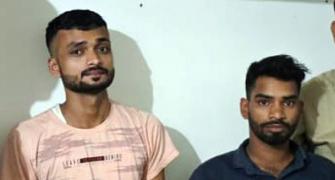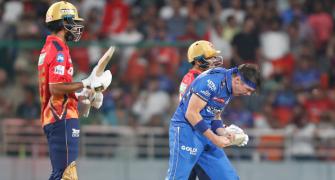Last year, Godrej Industries' director, marketing, Tanya Dubash, along with senior officials, attended a class with a difference at the group's sprawling premises at Vikhroli in Mumbai.
The company had invited its public relations agency Perfect Relations for an orientation programme on media interaction. "We are now trying to gain more mileage and credibility in the media by communicating through editorial content rather than advertising," says Dubash.
She isn't the only one. When Hans-Michael Hubert took over as managing director of luxury car maker Daimler Chrysler India two years ago, he took an orientation programme at Capital Images.
According to Suhas Kadlaskar, marketing director, Daimler Chrysler India, it covered an introduction to the Indian media, the type of publications, readership profile and how it differed from the western media.
Chandrababu Naidu, the erstwhile chief executive officer of Andhra Pradesh, had sought the services of public relations firms to hone his media management skills. Jack Smith, the erstwhile CEO of General Motors, too underwent a media sensitisation programme on his India visit a few years ago. And any number of company heads have gone through the grind.
ICICI Lombard, Prudential ICICI, Indian Airlines, the Tata group's key flagship companies like Tata Tele Services, Videsh Sanchar Nigam Ltd, Tata Chemicals, Cadbury's, Sun Microsystems, PeopleSoft Technologies, Du Pont and JP Morgan are just a few to have sent their senior and middle managers to media management classes.
Vaishnavi Communications, the Delhi-based public relations company, for example, recently organised one such evening session for a Tata company and invited Mumbai-based journalists to meet the company's brass at Bombay House, the Tata group's head office, and offer their views on the company's media profile and explain how the media works.
This was followed later by mock interviews, conducted by a former Delhi-based journalist and by a Bangalore-based writer.
Why is India Inc enrolling for media training? Says K P Unnikrishnan, marketing director, Sun Microsystems, which sought the services of Vaishnavi: "It was to ensure that our departmental heads are giving the right messages in the right language. Also, we wanted to cut down on irrelevant information and communicate what the media needs."
According to Vinod Moorthy, director operations, Good Relations India with accountability being an issue, companies are subjected to an unprecedented level of media scrutiny. "They are seeing the positive benefits of effective media handling like enhancing stakeholder value and winning over business partners and consumers."
Also, with the proliferation of the electronic media, companies are putting their top brass through on-camera mock interviews. That's because television does not afford the luxury of oft-repeated statements like 'will get back to you' or 'no comments'.
Then, with the growing number of Hindi news channels, companies are fine tuning their Hindi diction. Ashok Purang, course co-ordinator at Sampark PR, who also trains Bollywood stars, has been helping clients to get a grip on the national language.
A programme can last from just half a day to over two days at the company offices. For instance, GRI's day-long media sensitisation workshop has three modules.
The first has three interactive classroom style sessions - one each on the Indian cultural context, the Indian print media and the electronic media. The second module consists of customised role plays of simulated media interview situations, which are held in-camera.
In the final module, feedback on each participant is provided individually, along with specific prescriptions to improve effectiveness.
Crisis management is part of Rediffusion PR's programme. Corporate Voice Shandwick designs country specific briefings for spokespersons as and when they are travelling.
Percept Profile briefs corporates about the changing information requirements in the Indian media and increasing predatory marketing using the media. It has modules that focus on planning and understanding the media as a target audience.
Says Ajai Sharma, CEO, Percept Profile: "By using case studies, we show how savvy media managers can be subjected to the most obvious faux pas in managing media and how a manager has to think on his or her feet."
For all this, corporates are shelling out Rs 50,000 to Rs 200,000 per training, depending on the number of participants and the time involved. The PR arms of Ogilvy and Rediffusion are offering media training as part of their retainer fee arrangements to their existing clients.
The programmes have now become an integral part of PR firms. "It contributes 6-7 per cent to the total business and is expected to go up to 10 per cent on a larger base," says N S Rajan, managing director, Sampark PR. Where the package is built into the retainership, the additional fee, if any, is not more than 5 per cent of the annual billing, says Percept's Sharma.
India Inc, it seems, is learning the rules of the media game from the media itself.





